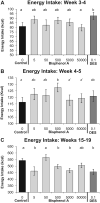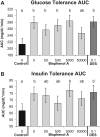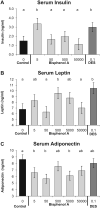Metabolic disruption in male mice due to fetal exposure to low but not high doses of bisphenol A (BPA): evidence for effects on body weight, food intake, adipocytes, leptin, adiponectin, insulin and glucose regulation
- PMID: 23892310
- PMCID: PMC3886819
- DOI: 10.1016/j.reprotox.2013.07.017
Metabolic disruption in male mice due to fetal exposure to low but not high doses of bisphenol A (BPA): evidence for effects on body weight, food intake, adipocytes, leptin, adiponectin, insulin and glucose regulation
Abstract
Exposure to bisphenol A (BPA) is implicated in many aspects of metabolic disease in humans and experimental animals. We fed pregnant CD-1 mice BPA at doses ranging from 5 to 50,000μg/kg/day, spanning 10-fold below the reference dose to 10-fold above the currently predicted no adverse effect level (NOAEL). At BPA doses below the NOAEL that resulted in average unconjugated BPA between 2 and 200pg/ml in fetal serum (AUC0-24h), we observed significant effects in adult male offspring: an age-related change in food intake, an increase in body weight and liver weight, abdominal adipocyte mass, number and volume, and in serum leptin and insulin, but a decrease in serum adiponectin and in glucose tolerance. For most of these outcomes non-monotonic dose-response relationships were observed; the highest BPA dose did not produce a significant effect for any outcome. A 0.1-μg/kg/day dose of DES resulted in some but not all low-dose BPA outcomes.
Keywords: Adipocytes; Endocrine disruption; Food intake; Glucose tolerance; Metabolic syndrome.
Copyright © 2013 Elsevier Inc. All rights reserved.
Figures







References
-
- Alonso-Magdalena P, Quesada I, Nadal A. Endocrine disruptors in the etiology of type 2 diabetes mellitus. Nature Reviews Endocrinology. 2011;7:346–53. - PubMed
-
- Kasturi SS, Tannir J, Brannigan RE. The metabolic syndrome and male infertility. Journal of Andrology. 2008;29:251–9. - PubMed
-
- Heindel JJ, vom Saal FS. Overview of obesity and the role of developmental nutrition and environmental chemical exposures. Molecular and Cellular Endocrinology. 2009;304:90–6. - PubMed
Publication types
MeSH terms
Substances
Grants and funding
LinkOut - more resources
Full Text Sources
Other Literature Sources

